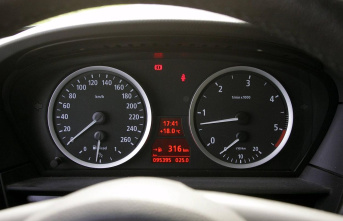A good two years after the spectacular Lufthansa rescue, the German state has sold the last shares in the airline group.
The federal economic stabilization fund (WSF) realized a profit of 760 million euros. Part of the shares went to the logistics entrepreneur Klaus-Michael Kühne, who, as the largest single shareholder in the MDax group, increased his stake to 17.5 percent. Lufthansa boss Carsten Spohr thanked the federal government and taxpayers again on Wednesday for their support in the company's worst crisis.
The federal finance agency announced on Tuesday evening in Frankfurt that the federal government had ended the stake in Lufthansa that had been built up during the Corona crisis. At 1.07 billion euros, the total proceeds from the block of shares significantly exceeded the invested amount of 306 million euros. In June 2020, the WSF came into possession of a good 20 percent of all Lufthansa shares via a capital increase and only had to pay the nominal value of 2.56 euros per share.
The majority of the profit that has now been realized can be explained by the difference to the significantly higher stock exchange price of currently around 6 euros. According to Lufthansa, it also paid 92 million euros in interest on loans and silent participations from the German state. These have already been returned in full by November 2021.
Seat on the supervisory board for Kühne?
"Lufthansa is once again in private hands," Spohr said. With the premature end of the state involvement, which should have lasted until October 2023, the company is completely returning to normal. Since the repayment of the silent participations in November 2021, bonuses have been allowed to be paid to the managers again and, in the future, dividends to the owners as well. The takeover of foreign airlines is also possible again, although Lufthansa has recently fallen behind in the race for the Italian Alitalia successor Ita.
What is new, however, is the increasing influence of the shareholder Kühne. Although he has announced in interviews that he wants to stay out of the operative business, according to information from the "Handelsblatt" he is aiming for at least one seat on the supervisory board. Kühne's confidante Karl Gernandt is planned, who is to move into the control committee by the next general meeting on May 9, 2023 at the latest. The Swiss Kühne Holding AG of the Hamburg billionaire declined to comment.
In the course of the state participation, which has now ended, Lufthansa had appointed two supervisory boards, which were to take the interests of the WSF into account. It was about the Hamburg port boss Angela Titzrath and the former boss of Munich Airport, Michael Kerkloh. According to the company, both are properly appointed and do not have to resign automatically.
Four states involved in Lufthansa support
The company leaves state care with a higher level of debt because the costly state aid was replaced with funds from private donors after the risk of insolvency had passed. The aid from Switzerland was also repaid. Spohr had always emphasized that he would rather be indebted to the capital market than to the taxpayer. However, state aid from Austria (EUR 210 million) and Belgium (EUR 287 million) is still open, as the company announced in its most recent quarterly report.
Germany, Austria, Switzerland and Belgium had grabbed the Lufthansa Group's wings after the collapse of air traffic as a result of the corona pandemic. In total, they pledged nine billion euros to the group, with the lion's share of the sum coming from Germany, Lufthansa's home country. The WSF accounted for six billion euros, including the block of shares, while the state-owned KfW bank contributed a loan of one billion euros.







